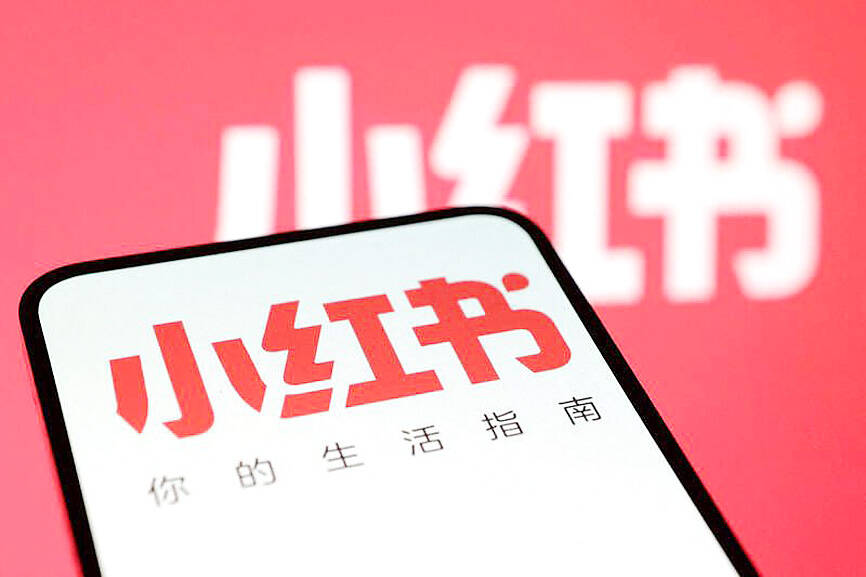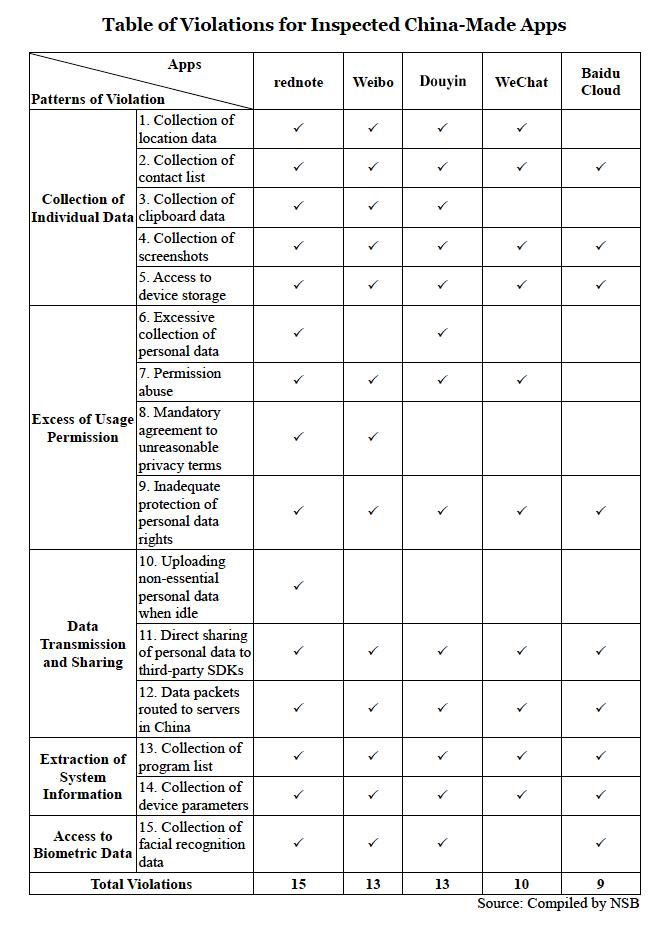The National Security Bureau (NSB) yesterday urged Taiwanese to exercise caution when using Chinese social media mobile applications due to potential privacy and national security issues, following an inspection of apps such as Douyin (抖音, the Chinese version of TikTok) and Xiaohongshu (小紅書, known as RedNote in English).
The inspections by Taiwan’s top intelligence agency of five apps, which also included the Chinese social media platforms Sina Weibo (新浪微博) and WeChat (微信), as well as Baidu Cloud (百度雲), found serious contraventions of users’ communications security across several indicators, the bureau said in a statement.
The inspections, conducted jointly with the Ministry of Justice Investigation Bureau and the Criminal Investigation Bureau, covered 15 indicators in five categories: personal data collection, excess usage of permissions, data transmission and sharing, system information extraction and access to biometric data.

Photo: Reuters
The review revealed that all five apps failed to meet many of the indicators, with Xiaohongshu, the Chinese equivalent of Facebook, failing to meet all 15 of them, the NSB said.
Sina Weibo and Douyin did not meet 13 of the 15 indicators, while WeChat failed 10 and Baidu Cloud nine.
“These findings suggest that the China-made apps present cybersecurity risks far beyond the reasonable expectations for data-collection requirements taken by ordinary apps,” the bureau said in the English-language statement.

All of the apps had security issues related to excessive collection of personal data and abuse of system permissions, with contraventions including unauthorized access to screenshots, clipboard content, contact lists and location data, as well as inadequate protection of personal information rights.
All five apps collected users’ application lists and device parameters (in the system information extraction category), and four of them collected facial recognition data, which the NSB said might be deliberately harvested and stored by those apps.
The apps were also found to send packets back to servers in China, raising serious concerns over the potential misuse of personal data by third parties, it said.
Under China’s Cybersecurity Law and National Intelligence Law, Chinese companies are obligated to turn over user data to authorities when it involves national security, public security or intelligence, the NSB said.
Such a practice would significantly breach the privacy of Taiwanese users and could support data collection by Chinese agencies, it said.
People must “remain vigilant regarding mobile device security and avoid downloading China-made apps that pose cybersecurity risks, to protect personal data privacy and corporate business secrets,” it said.
Since 2019, Taiwan has banned TikTok, Douyin (抖音, the Chinese version of TikTok) and Xiaohongshu from government devices and official premises over national security concerns.
However, there is no ban on the private use of the apps.

The Central Election Commission has amended election and recall regulations to require elected office candidates to provide proof that they have no Chinese citizenship, a Cabinet report said. The commission on Oct. 29 last year revised the Measures for the Permission of Family-based Residence, Long-term Residence and Settlement of People from the Mainland Area in the Taiwan Area (大陸地區人民在台灣地區依親居留長期居留或定居許可辦法), the Executive Yuan said in a report it submitted to the legislature for review. The revision requires Chinese citizens applying for permanent residency to submit notarial documents showing that they have lost their Chinese household record and have renounced — or have never

A magnitude 5.6 earthquake struck off the coast of Yilan County at 12:37pm today, with clear shaking felt across much of northern Taiwan. There were no immediate reports of damage. The epicenter of the quake was 16.9km east-southeast of Yilan County Hall offshore at a depth of 66.8km, Central Weather Administration (CWA) data showed. The maximum intensity registered at a 4 in Yilan County’s Nanao Township (南澳) on Taiwan’s seven-tier scale. Other parts of Yilan, as well as certain areas of Hualien County, Taipei, New Taipei City, Taoyuan, Hsinchu County, Taichung and Miaoli County, recorded intensities of 3. Residents of Yilan County and Taipei received

Taiwan has secured another breakthrough in fruit exports, with jujubes, dragon fruit and lychees approved for shipment to the EU, the Ministry of Agriculture said yesterday. The Animal and Plant Health Inspection Agency on Thursday received formal notification of the approval from the EU, the ministry said, adding that the decision was expected to expand Taiwanese fruit producers’ access to high-end European markets. Taiwan exported 126 tonnes of lychees last year, valued at US$1.48 million, with Japan accounting for 102 tonnes. Other export destinations included New Zealand, Hong Kong, the US and Australia, ministry data showed. Jujube exports totaled 103 tonnes, valued at

BIG SPENDERS: Foreign investors bought the most Taiwan equities since 2005, signaling confidence that an AI boom would continue to benefit chipmakers Taiwan Semiconductor Manufacturing Co’s (TSMC, 台積電) market capitalization swelled to US$2 trillion for the first time following a 4.25 percent rally in its American depositary receipts (ADR) overnight, putting the world’s biggest contract chipmaker sixth on the list of the world’s biggest companies by market capitalization, just behind Amazon.com Inc. The site CompaniesMarketcap.com ranked TSMC ahead of Saudi Aramco and Meta Platforms Inc. The Taiwanese company’s ADRs on Tuesday surged to US$385.75 on the New York Stock Exchange, as strong demand for artificial intelligence (AI) applications led to chip supply constraints and boost revenue growth to record-breaking levels. Each TSMC ADR represents